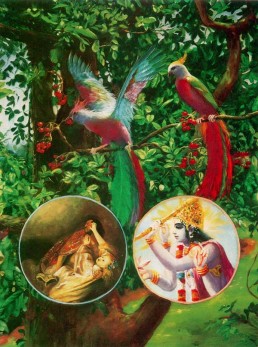Swami Chinmayananda
Swami Chinmayananda Commentary
OF THE VRISHNIS, I AM VAASUDEVA — Among the Yadavas, the ancestor Yadu had a son Vrishni. All the descendants of Vrishni together constitute the tribe called the ‘Vrishnis.’ In this tribe was born Vasudeva as the great-great-grandson of Vrishni. Vasudeva married Devaki, the sister of the Mathura-tyrant, Kamsa, and to her was born Krishna. As the son of Vasudeva, the Lord is called “Vaasudeva.”OF THE PANDAVAS, I AM DHANANJAYA — Just as Krishna was the mighty one that had given pride and glory to both the Yadavakula and the Vrishni-clan, because of which they have a glorious existence in the memory of man, so too among the Pandavas, He again was the soul-giving factor, but for whom, the five brothers would perhaps have achieved nothing. The term Dhananjaya literally means “the winner of wealth.” Generally, this term is considered as a title of Arjuna, and therefore, this portion is usually translated as “I AM ARJUNA, AMONG THE PANDAVAS.”
OF ALL THE SAINTS I AM VYASA — This is not an unfair passage of self-advertisement thrown in by Vyasa himself, the author of the Geeta. Vyasa was a pen-name which came to symbolise the new style of literature that was discovered and introduced into the realm of philosophical and religious writings of that age. The style was revolutionary, for, till then, philosophical literature was in mantra-form — “thoughts packed into small language-capsules.” With the Puranas, a new style was initiated and developed, where elaboration was the motive and repeated over-emphasis of the fundamentals was the general technique. This was innovated by Krishna Dwaipayana under a suggestive pen-name, Vyasa, explaining in itself his own literary art of elaboration.
Thus “OF ALL THE MUNIS, I AM VYASA” should suggest that of all the men of reflection, the Lord is He, who is behind the stupendous work that stands today under the title ‘Puranas.’
OF THE SEERS, I AM USHANA — Nowhere do we find any mention of this seer in the available popular books. But Anandagiri somehow identifies Ushana with Shukra, though he too does not explain how he identifies these two together. The planet Venus, also called Shukra, was the son of Bhrigu, and the preceptor of the Daityas. Shukra is called Kavi in the Rig Veda.
In the Upanishads, Kavi means a seer of the Vedic mantras. Men of inspiration, declaring their experiences, without ego-centric awareness, were called Kavis; later on the term deteriorated to mean writers of poetry, who too, at the sight of the spectacular Universe got themselves lifted from themselves and seemed to enter into a realm of their own brilliant notions, from the caves of which they sang their harmonious rhythm of poetic cadence. Here, however, it is used in the original meaning as a seer.
FURTHER, IF I MAY ELABORATE, I AM, SAYS THE LORD:
Adi Sankara Commentary
Vrsninam, of the Vrsnis, [Here Ast. adds yadavanam, of the Yadavas.-Tr.] I am Vasudeva- I who am this person, your friend. Pandavanam, of the Pandavas, (I am) Dhananjaya, you yourself. Api, and; muninam, of the wise, of the thoughtful, of those who know of all things, I am Vyasa. kavinam, of the omniscient (i.e. of the those who know the past, present and future), I am the omniscient Usanas (Sukracarya).
The Bhagavad Gita with the commentary of Sri Sankaracharya – Translated by Alladi Mahadeva Sastry
Holy Geeta – Commentary by Swami Chinmayananda
The Bhagavad Gita by Eknath Easwaran – Best selling translation of the Bhagavad Gita
The Bhagavad Gita – Translation and Commentary by Swami Sivananda
Bhagavad Gita – Translation and Commentary by Bhaktivedanta Swami Prabupadha
Srimad Bhagavad Gita Chapter 10 – Verse 37 – 10.37 vrsninam vasudevo’smi – All Bhagavad Gita (Geeta) Verses in Sanskrit, English, Transliteration, Word Meaning, Translation, Audio, Shankara Bhashya, Adi Sankaracharya Commentary and Links to Videos by Swami Chinmayananda and others – 10-37

